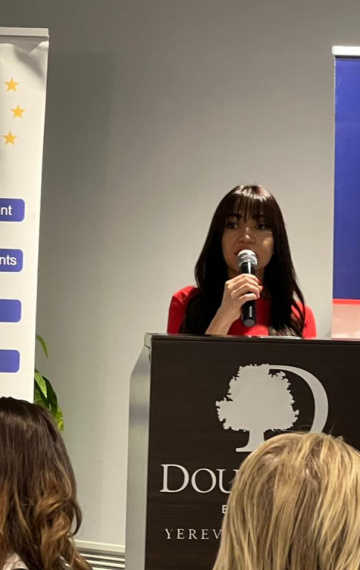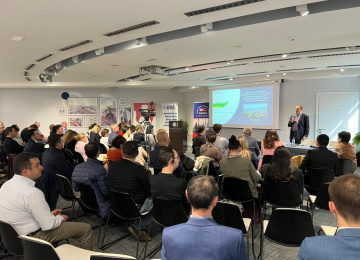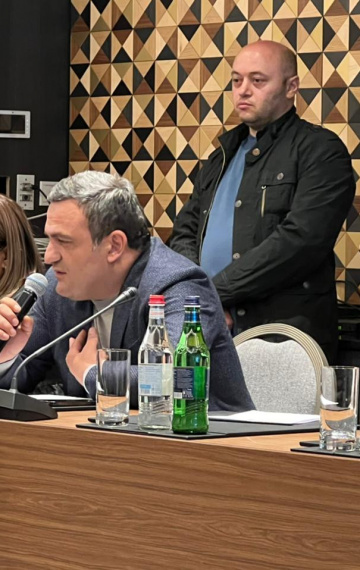
Changing behaviour is the most time-consuming change. For one thing, it’s sometimes the most difficult need to notice and to reveal, too. And so, improving lobbying and advocacy instruments, and setting up effective public-private dialogue platforms to achieve a more enabling business environment for SMEs in Armenia was not the easiest path for the European Business Association (EBA) to follow.
Within its “Support to European Businesses in Armenia” project under the EU4Business umbrella, the EBA started by strengthening the internal capacity of its staff, established new working groups and committees, and established fruitful cooperation with Armenia government since 2018.
About 800 private sector representatives engaged in a total 34 public-private dialogues at EBA-initiated meetings. These proved an important platform for identifying business concerns and constraints in the reform process, and for ensuring that reforms actually target and benefit business. As a result, 13 laws and regulations were changed in Armenia.
From talk to change
The work done under the EU4Business for the SME sector in Armenia includes capacity-building, a drive for reforms, and an engagement process. A lobbying and advocacy council with involving the BIG4, Schneider Group and other consultancies raised issues related to the tax, customs, public procurement, competition, and judicial systems. Their ultimate goal was improving Armenia’s business climate.
The EBA not only submitted proposals related to Public Procurement, the Labour Code, foreign investment legislation, the Tax Code and customs legislation, and offering inputs into the draft legislation for competition. It also continued advocacy and ongoing work with the Armenia authorities to achieve changes. Similarly, through its presence on the Tourism Council, the EBA presented proposals related to improving the tourism sector.
Sargis Harutyunyan, General Manager at Softline Armenia, the local branch of a leading global solutions and services provider in digital transformation and cybersecurity, was actively engaged in advocating for reforms in both procurement and tourism with the EBA.
“We have worked with the support of the EBA on issues in public tenders,” Harutyunyan explains. “Based on that, we established the Information and Communications Technologies or ICT council, gathered together with other IT companies, and are now working to push the government to improve conditions for the ICT sector.”
IT technologies are developing at a tremendous pace, partly due to the development of business and other needs, Softline Armenia’s IT General Manager elaborates. “Today, IT is developing in three main directions: digital transformation, cloud technologies and information security,” he points out. “Companies want to integrate these technologies, not only because of convenience and the speed of solving various problems, but also in order to remain competitive.”
Incorporating these technological changes in Armenia will make the lives of SMEs better, easier and more effective. It will also help them to remain competitive, not only on the local market, but also globally, which is especially important for the tourism sector.
“Together with the EBA, we organized a major conference for companies in the tourism sector to discuss key IT-related issues for hospitality companies and presented potential solutions for them,” Harutyunyan concludes.
Getting more efficient
Improvements in the Business Enabling Environment will inevitably improve competitiveness, lower costs, and make SMEs more efficient. Potentially all SMEs will benefit from certain legislative changes, such as streamlining tax processes, which lowers costs for SMEs.
Raising awareness about tax administration and legislation, and advocating for improvements have been a major focus of EBA activities. The private sector directly raised issues during the discussion meetings involving EBA members, EBA partner organizations, and top officials of tax administration and legislation development institutions. This included specifically Armenia’s Ministry of Finance, the State Revenue Committee, and the Ministry of Economy. Representatives of the World Bank, the IMF and other stakeholders also participated.
The shift from a five-tier tax system to a three-tiered one was introduced, interest rates on certain types of taxes were reduced, personal income taxes were levelled, equal conditions for non-residents were promoted, and the dividend tax on non-residents was reduced to 5% from 10%.
Thanks to the project efforts, Armenia has improved its position in international ratings. The World Bank’s Doing Business index has seen Armenia improve by 30 points, moving from 82nd to 52nd place by the end of 2019.
Broad cooperation
Business sectors like waste management and insurance were also considered in the EBA project’s various activities. Through the Waste Management initiative with the American University of Armenia and the American Chamber of Commerce (AmCham), a working group was established to bring in international expertise from other markets around the world to learn and adapt to Armenia. An initial study and business model for Armenia was developed and presented to the government in April, 2020.
“From the industry perspective, our intention is to plan and execute at least one pilot with a coverage of 20,000-30,000 people for at least a two-year period, in fully operational mode,” says Elina Markaryan, Corporate Affairs and Sustainability Director at Coca-Cola HBC Armenia and also Vice President of AmCham. “The idea is that, at the end of the two years, the actual implementation of extended producer responsibility or EPR for packaging will adopt the initiative and expand it to other areas in the country.”
Markaryan believes that such pilots will help collect valuable information and experiences from field applications, and cost information that will be very important for fully operational EPR implementation. “At the same time, they will allow the industry, local authorities, and the government to understand and deal with potential challenges in a proper implementation,” she notes.
The EBA was also involved in developing a comprehensive health insurance strategy and a further regulatory package was submitted to the Government of Armenia for consideration as part of its health insurance reforms.
“We completed an incredible amount of work in the ongoing process of capturing of needs, aligning the industry and following up with government agencies and other institutions,” recalls Lusine Mnatsakanyan, Country Legal Manager at Coca-Cola HBC Armenia and Chair of the AmCham Legal Committee in Armenia. “This work was carried out with the participation of AmCham’s legal and tax committees, including deeper analysis by the working group and extended alignment with the EBA, the British Chamber and Union of Manufacturers and Businessmen of Armenia.”
Active involvement in developing draft regulations and adjusting them to development needs, supporting public-private dialogue by addressing strategic needs from a private sector perspective, driving a data and reality-based revision of legislative environment to strengthen Armenia’s business and investment climate and to ensure the protection of the rights of individuals — all this is a perfect summary of the EU4Business project’s objectives and activities. That’s how the project ensured a better environment for SMEs in Armenia.




